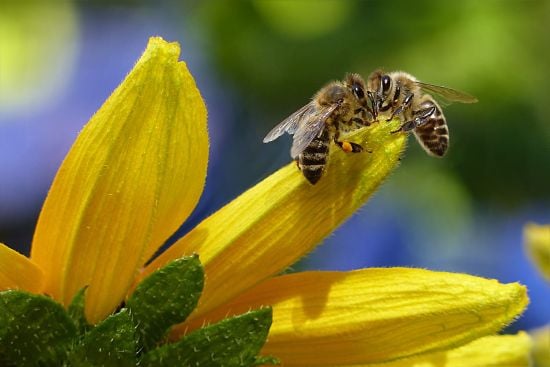9 Plants To Grow That Are Bee-Friendly

Bees are an essential part of our ecosystem, playing a vital role in pollination and helping to support biodiversity. However, bee populations have been declining in recent years, making it more important than ever to create bee-friendly habitats in our gardens. In this guide, we'll explore 9 plants that are known to attract bees and other pollinators to your garden, providing you with the inspiration and knowledge you need to create a bee-friendly oasis.
- Lavender - The fragrant flowers of lavender are a favourite of bees and other pollinators. The long spikes of purple or blue flowers bloom in late spring and early summer, providing a vital source of nectar and pollen for bees and other pollinators. Not only do they attract bees, but the oils produced by lavender plants also have a calming effect on bees, making them less likely to sting.
- Sunflowers – Bee’s love The large, bright yellow or orange flowers of sunflowers. Sunflowers provide an abundant source of nectar and pollen, making them an essential food source for bees and other pollinators during the summer months.
- Daisies - The bright, daisy-like flowers of daisies are beloved by bees. They are also a great source of nectar and pollen, making them an important food source for bees. The flowers can be white, yellow, pink or purple and are a great source of nectar for bees. Marigolds - The bright, cheerful flowers of marigolds are a great source of food for bees and other pollinators. They are also a great source of nectar and pollen, making them an important food source for bees. Marigolds are also known to repel certain pests, making them a great addition to a vegetable garden.
- Echinacea (coneflower) - The large, daisy-like flowers of echinacea, bee’s and other pollinators thrive on the nectar and pollen from these plants. They are also a great source of nectar and pollen, making them an important food source for bees. Echinacea is also known for its medicinal properties and is often used as an herbal remedy.
- Salvia - The tall spikes of salvia flowers are known to be a preferred food source for bees. They come in a variety of colours, including blue, purple, and red, and are known to bloom throughout the summer and into the fall. Salvia is also a great source of nectar and pollen, making them an important food source for bees.
- Asters - The star-shaped flowers of asters draw bees to these plants due to their abundance of nectar and pollen. They come in a variety of colours, including pink, purple, and white, and are known to bloom throughout the fall. Asters are also a great source of nectar and pollen, making them an important food source for bees.
- Borage - The bright, star-shaped flowers of borage are a vital source of sustenance for bees. They are known to bloom throughout the summer and are also a great source of nectar and pollen, making them an important food source for bees. Borage is also known for its medicinal properties and is often used as an herbal remedy.
- Catmint - The fragrant flowers of catmint are critical for the well-being of bees and other pollinators as they provide them with nectar and pollen. They come in a variety of colours, including blue and purple, and are known to bloom throughout the summer. Catmint is also a great source of nectar and pollen, making them an important food source for bees.
- Foxgloves - The tall spikes of foxglove flowers play a crucial role in the diets of bees. They come in a variety of colours, including pink, purple, and white, and are known to bloom throughout the spring and summer. Foxgloves are also a great source of nectar and pollen, making them an important food source for bees.
In conclusion, planting bee-friendly plants in your garden is an easy way to help support bee populations and promote biodiversity. These 10 plants are known to be favourites of bees and other pollinators, providing an important source of nectar and pollen. Not only do these plants help the bees but also have other benefits such as being a great source of food, being an herbal remedy or repelling pests. So, take some time to plant some of these bee-friendly plants in your garden and enjoy the beauty of these plants while helping the bees and other pollinators.